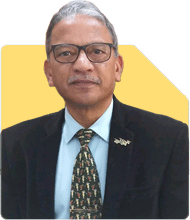Mayank Rautela | Answer |Ask -Follow
HR Expert - Answered on Feb 07, 2023
A management graduate from the Symbiosis Institute of Management Studies with a master's degree in labour laws from Pune University, Rautela has over 20 years of experience in general management, strategic human resources, global mergers and integrations and change management.... more

Hello sir, kindly advise is it advisable to stop working and do some part time jobs, for your information I am 61 and working as a Sales Manager with a pvt. firm, since 2014. Nair
You may like to see similar questions and answers below
Mayank Kumar | Answer |Ask -Follow
Education Expert - Answered on Mar 24, 2023
Nitin Sathe | Answer |Ask -Follow
HR, Recruitment Expert - Answered on Oct 25, 2023
Mayank Rautela | Answer |Ask -Follow
HR Expert - Answered on Nov 19, 2023
Ulhas Joshi |280 Answers |Ask -Follow
Mutual Fund Expert - Answered on Dec 05, 2025
Dr Dipankar Dutta |1835 Answers |Ask -Follow
Tech Careers and Skill Development Expert - Answered on Dec 04, 2025
Ravi Mittal |676 Answers |Ask -Follow
Dating, Relationships Expert - Answered on Dec 04, 2025
Anu Krishna |1745 Answers |Ask -Follow
Relationships Expert, Mind Coach - Answered on Dec 04, 2025
Anu Krishna |1745 Answers |Ask -Follow
Relationships Expert, Mind Coach - Answered on Dec 04, 2025
Mayank Chandel |2562 Answers |Ask -Follow
IIT-JEE, NEET-UG, SAT, CLAT, CA, CS Exam Expert - Answered on Dec 04, 2025
Mayank Chandel |2562 Answers |Ask -Follow
IIT-JEE, NEET-UG, SAT, CLAT, CA, CS Exam Expert - Answered on Dec 04, 2025
Mayank Chandel |2562 Answers |Ask -Follow
IIT-JEE, NEET-UG, SAT, CLAT, CA, CS Exam Expert - Answered on Dec 04, 2025
Mayank Chandel |2562 Answers |Ask -Follow
IIT-JEE, NEET-UG, SAT, CLAT, CA, CS Exam Expert - Answered on Dec 04, 2025
Mayank Chandel |2562 Answers |Ask -Follow
IIT-JEE, NEET-UG, SAT, CLAT, CA, CS Exam Expert - Answered on Dec 04, 2025
























